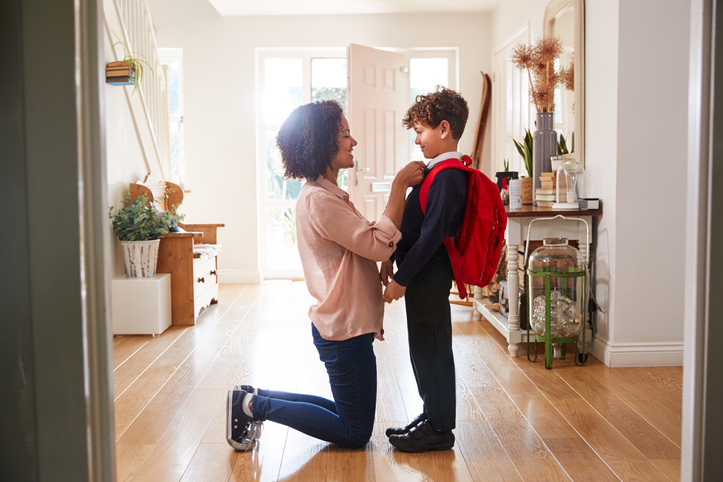We swear we’ll never act like or turn into our parents, and then one of their parental gems comes flying out of your mouth, and it’s official. Now, every time the kids drive you crazy, you can hear your mother or father’s voice in your head as you start dolling out the same annoying phrases they resorted to when you were growing up. This uneasy little trip down memory lane may make you laugh, cry, or re-think how you interact with your kids, and will confirm you’ve become your folks.
1. “Your Room Looks Like a Tornado Hit It”

The chaos of a child’s messy room is enough to send any parent over the edge. If you hear yourself saying, “Clean your room; it looks like a tornado hit,” you might sound like someone you know. As you’ll remember, this felt like a personal attack, and you wanted your parents to get out. Say this to flex your gentle parenting muscles, “Let’s clean up together; it’ll be quicker and more fun if we use teamwork.” Working with your kids to create an organized environment and encouraging them to take ownership of their space are good life skills to develop early.
2. “What Do You Think I Am, Your Maid?”

Kids can be lazy and demanding and consider you their live-in maid, so this has undoubtedly come hurtling out of your mouth. Setting boundaries and teaching kids to be self-sufficient is essential, but this is passive-aggressive and doesn’t resolve the issue. They’ll probably respond with “yes.” Allocating chores for which your children are responsible teaches them independence and teamwork.
3. “I Told You to Go to the Bathroom Before We Left.”

You’ve become your parents if you’ve ever used this on a whining child in the car. You might be trying to get them to understand the importance of listening, preparation, and planning, but it comes off as an “I told you so” moment for kids. A better, more educational approach is: “Next time, let’s remember to use the bathroom before we head out so we don’t have to make extra stops.” This encourages them to think ahead and take ownership of their needs.
4. “You Have No Idea How Easy You Have It.”

When you remind your kids how hard you had it growing up, you channel every parent who came before you. Your kids will probably start rolling their eyes like you did, or they may even feel guilty or sorry for you. While intended to make kids appreciate their lives and comforts, this classic line can undermine their struggles and make them feel unheard. A better approach is to make them feel like an important part of the family dynamic. You could say, “I found some things tough growing up, too, but in a family, we must support each other, share responsibility, and be grateful for what we have.”
5. “Every Penny Counts”

There’s unlikely a parent alive who hasn’t resorted to this one when your kid begs for something. The problem with this guilt trip is that it can create a sense of financial insecurity in kids. While it’s meant to teach kids the value of money and that it “doesn’t grow on trees,” it can confuse them, especially if they see you splurging on stuff for yourself. Kids can’t see past their needs and want instant gratification, so instead, encourage a healthy relationship with money and set goals. “Let’s create a budget and set some chores so you can save up for what you want.”
6. “Because I’m the Boss”

This is the mic drop in any parent-child battle. Yes, you really went there. You’ve reached your limits and hit peak parental hypocrisy when dishing out this gem. It’s a way to assert authority and demand obedience when all else fails, but it can make kids feel powerless, frustrated, and unheard. Try a more inclusive approach: “I’m going to explain the reasons behind my request or decision so you can understand them and that they are for your benefit.”
7. “You’ll Get it When You’re Older.”

This is the ultimate brush-off and cop-out for when you can’t or won’t explain something to your child. Your kids may very well be too young to understand, but this can cause confusion and worry, and they may feel dismissed or that their concerns aren’t valid. They also may be unable to leave it alone and feel it’s wrong to question things. Instead, give a child-friendly explanation of the situation and reassure them they don’t need to worry, the parents have it under control, but they are free to ask any questions.
8. “Kids are Starving in the World”

This global guilt trip never gets old. Unfortunately, the go-to parental tactic to get kids to eat their veggies, finish their food, and stop being picky eaters tends to fall on deaf ears. Kids can’t relate to issues they don’t understand, so encourage healthy eating by bringing it back to them. “Did you know eating healthy food, especially fruits and veggies, makes us grow big and strong? And if we eat healthy most of the time, it’s okay to have ice cream or a treat occasionally.”
9. “I’m Not a Taxi Driver You Know”

One of the most exasperating things about parenting is playing chauffeur. If you get fed up spending your life in the car ferrying everyone to sports practice, dance class, and friends’ houses, you’re not alone. So when the kids want to be driven somewhere else or picked up, it’s easy to resort to this phrase your parents loved. However, it makes kids feel like they’re a burden. A better approach is to help your kid understand that your time and energy matter and that planning ahead is essential. You could also suggest a carpool schedule.
10. “You’re Not Leaving the House Like That”

Remember how much you hated it when your parents said this to you—it reeks of parental judgment and disapproval. If your kid’s outfit is a serious cause for concern, explain why instead of making them feel bad, and help them find a solution. Or if it’s just because you’re offended (or don’t understand the trend), then ask yourself why and be aware you are stifling your child’s independence and sending a message they are not free to express their individuality.
11. “Go Outside and Play You’re Making Me Crazy”

This classic line, used by our parents to get you out of the house, made you feel like a nuisance. As you know now, it was your parent’s way of encouraging you to get in the fresh air, snap you out of boredom, and even give yourself a much-needed break. But it can feel mean and dismissive to kids and make them feel like they are in trouble. Suggest this instead: “Let’s go outside and get some fresh air. Being in nature is fun and also good for our health.”
12. “Stop Jumping Over the Furniture”

When the kids are jumping all over the furniture and rebounding off the walls, this phrase calls for calm amid the chaos. You might feel the kids are overstimulated and need quiet time, but this can make them feel like their energy and sense of fun are stifled. Instead, try: “Inside is where we stay safe and calm, enjoy our quiet time, and respect our furniture. Let’s save running and jumping for outside.”
13. “I’m Going to Count to Three.”

This half threat, half promise, has been passed down through the ages. You’ve hit full-on parent mode when you start a final countdown before the consequences. This can create fear and tension in kids and make them feel pressured. A gentler approach is to tell them what they need to do or stop doing, ask them to repeat it, set a time limit, and then tell them to come and let you know when it’s done.
14. “If I Find it, Look Out”

This vague threat is a parental classic designed to play on the fear of consequences. Your intention might be to motivate your kid to be more aware and responsible for their belongings, but it can backfire. Kids might feel anxious about what might happen if they don’t find the item, and can be super stressed that they lost it and feel guilty if it costs money. Encourage your child to retrace their steps, suggest places they haven’t thought of, and then say you will help when they have looked everywhere. It’s also good to suggest they have a set place to keep their things and always put them back there so they always know where to find them.





